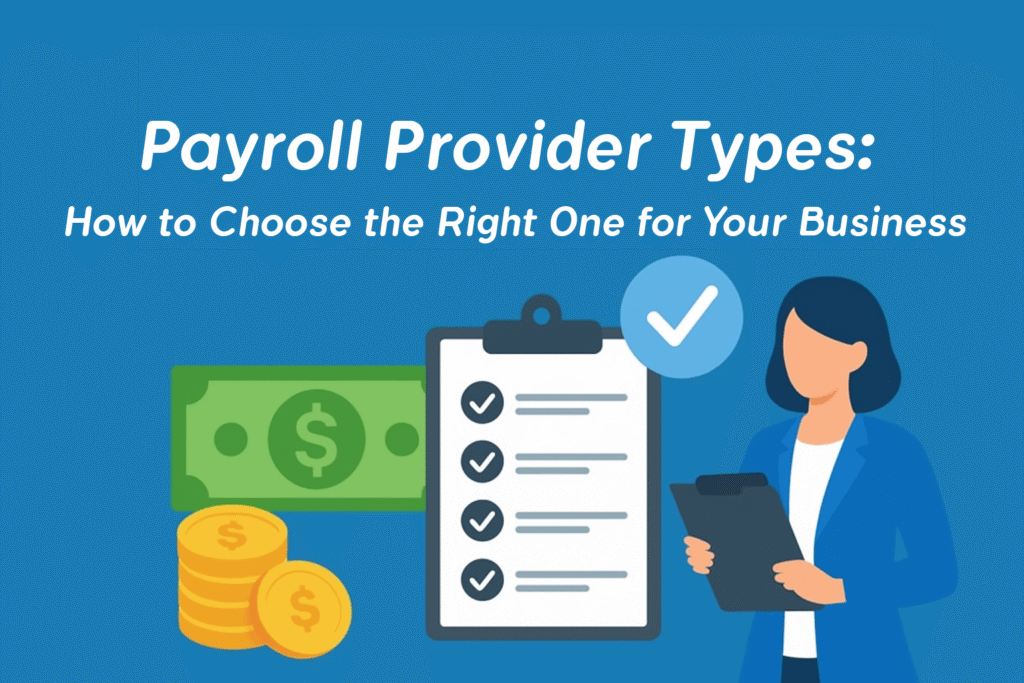Selecting the right payroll provider is more than just a financial decision—it’s a compliance and operational strategy. The wrong choice can lead to tax errors, penalties, and employee dissatisfaction, while the right one can streamline payroll, ensure tax accuracy, and free up time for business growth.
Payroll providers aren’t all the same. In fact, the IRS recognizes several distinct categories, each with different levels of responsibility, authority, and liability. Understanding these differences can help you choose the provider that matches your needs, risk tolerance, and budget.
In this article, we’ll explore the four main payroll provider types—Payroll Service Providers (PSP), Reporting Agents (RA), Section 3504 Agents, and Certified Professional Employer Organizations (CPEO)—and give you a detailed framework for selecting the right fit.
What Are the Four Main Types of Payroll Providers?
Payroll providers may seem similar at first glance, but the IRS actually recognizes distinct categories that differ in how they file taxes, whose EIN they use, and who holds legal responsibility if something goes wrong. Understanding these differences is crucial because your choice directly impacts your compliance obligations, liability exposure, and day-to-day payroll operations. Broadly, payroll providers fall into four main types—Payroll Service Providers (PSP), Reporting Agents (RA), Section 3504 Agents, and Certified Professional Employer Organizations (CPEO)—each offering a unique mix of authority, features, and risk-sharing.
1. Payroll Service Provider (PSP)
A Payroll Service Provider handles the fundamental payroll process, which includes:
- Calculating gross and net pay
- Withholding and remitting payroll taxes (federal, state, and local)
- Filing payroll tax returns using the employer’s EIN
- Collecting and reporting Federal Unemployment Tax Act (FUTA) contributions
Key points:
- The employer remains fully liable for all filings and tax payments.
- The provider acts as a service vendor, not a legal representative.
- If the provider makes an error, the IRS will hold you responsible.
Best for: Businesses that want control over their payroll filings and have internal staff to monitor accuracy.
2. Reporting Agent (RA)
A Reporting Agent offers all the services of a PSP but with enhanced authority to act on your behalf with the IRS.
How it works:
- You authorize the provider via IRS Form 8655.
- The RA files returns and makes tax payments under your EIN.
- They may receive IRS notices on your behalf.
Key points:
- This setup saves time and reduces administrative burdens.
- The employer is still liable for any inaccuracies.
- RAs do not assume legal responsibility for errors.
Best for: Businesses seeking convenience but still willing to oversee compliance.
3. Section 3504 Agent
A Section 3504 Agent has more authority than an RA but doesn’t take over the full employer role.
How it works:
- Uses its own EIN to file aggregate returns for multiple clients.
- Requires IRS Form 2678 to be appointed.
- Cannot handle FUTA payments.
Key points:
- Liability is shared between the employer and the agent.
- Offers stronger accountability but requires deep trust in the provider.
- Often used by staffing agencies, workforce intermediaries, or nonprofit organizations.
Best for: Businesses looking for shared risk and aggregated payroll handling.
4. Certified Professional Employer Organization (CPEO)
A CPEO provides the most comprehensive payroll and HR service. It essentially becomes a co-employer for tax purposes.
How it works:
- Uses its own EIN to file and pay taxes, including FUTA.
- Takes full responsibility for payroll tax compliance.
- Requires IRS certification via Form 8973.
- Often bundles HR, benefits administration, and compliance support.
Key points:
- Shifts tax liability away from the employer.
- Typically more expensive but offers the most hands-off experience.
Best for: Companies wanting maximum compliance protection and outsourced HR functions.
Summary Table of Payroll Provider Types
| Provider Type | Files Taxes? | Handles FUTA? | EIN Used | Liability |
| Payroll Service Provider (PSP) | Yes | Yes | Employer’s EIN | Employer only |
| Reporting Agent (RA) | Yes | Yes | Employer’s EIN | Employer only |
| Section 3504 Agent | Yes | No | Agent’s EIN | Shared liability |
| Certified PEO (CPEO) | Yes | Yes | CPEO’s EIN | CPEO assumes liability |
How to Choose the Right Payroll Provider
- Assess Your Needs
- Payroll complexity (multiple states, varying pay rates)
- Need for HR integration
- Your risk tolerance for tax liability
- Budget constraints
- Evaluate Services and Features
- Automated tax calculations and filings
- Direct deposit and pay card options
- Employee self-service portals
- Time tracking and PTO management
- Benefits administration (if needed)
- Understand Liability and Compliance Support
- Who is legally liable for errors?
- How will tax notices be handled?
- Does the provider monitor compliance changes?
- Check Technology and Integration
- Ensure the system integrates with:
- Accounting software
- HR management systems
- Time tracking tools
- Ensure the system integrates with:
- Compare Pricing Transparently
- Setup fees
- Per-payroll processing fees
- Year-end W-2/1099 preparation costs
- Termination or change fees
- Review Security Measures
- Use encryption for sensitive data
- Limit internal access to payroll funds
- Offer backup and recovery processes
10 Key Questions to Ask Any Payroll Provider
- Who is liable if there’s a payroll or tax filing error?
- Will you file and pay all taxes automatically?
- Do you handle multi-state payroll?
- Can you integrate with our accounting and HR systems?
- How do you protect payroll data?
- What is your customer support response time?
- Can employees access pay stubs and tax forms online?
- How do you handle IRS or state payroll notices?
- Are there any hidden or seasonal fees?
- Do you offer scalability as we grow?
Final Thoughts
Choosing a payroll provider isn’t a one-size-fits-all decision. The four provider types—PSP, RA, Section 3504 Agent, and CPEO—offer varying levels of service, authority, and liability. If you want full control but minimal cost, a PSP might suffice. If you want to offload tax risk, a CPEO could be worth the investment.
The right choice aligns your business needs, compliance comfort level, and budget—helping you not only pay employees on time but also stay worry-free about taxes.







